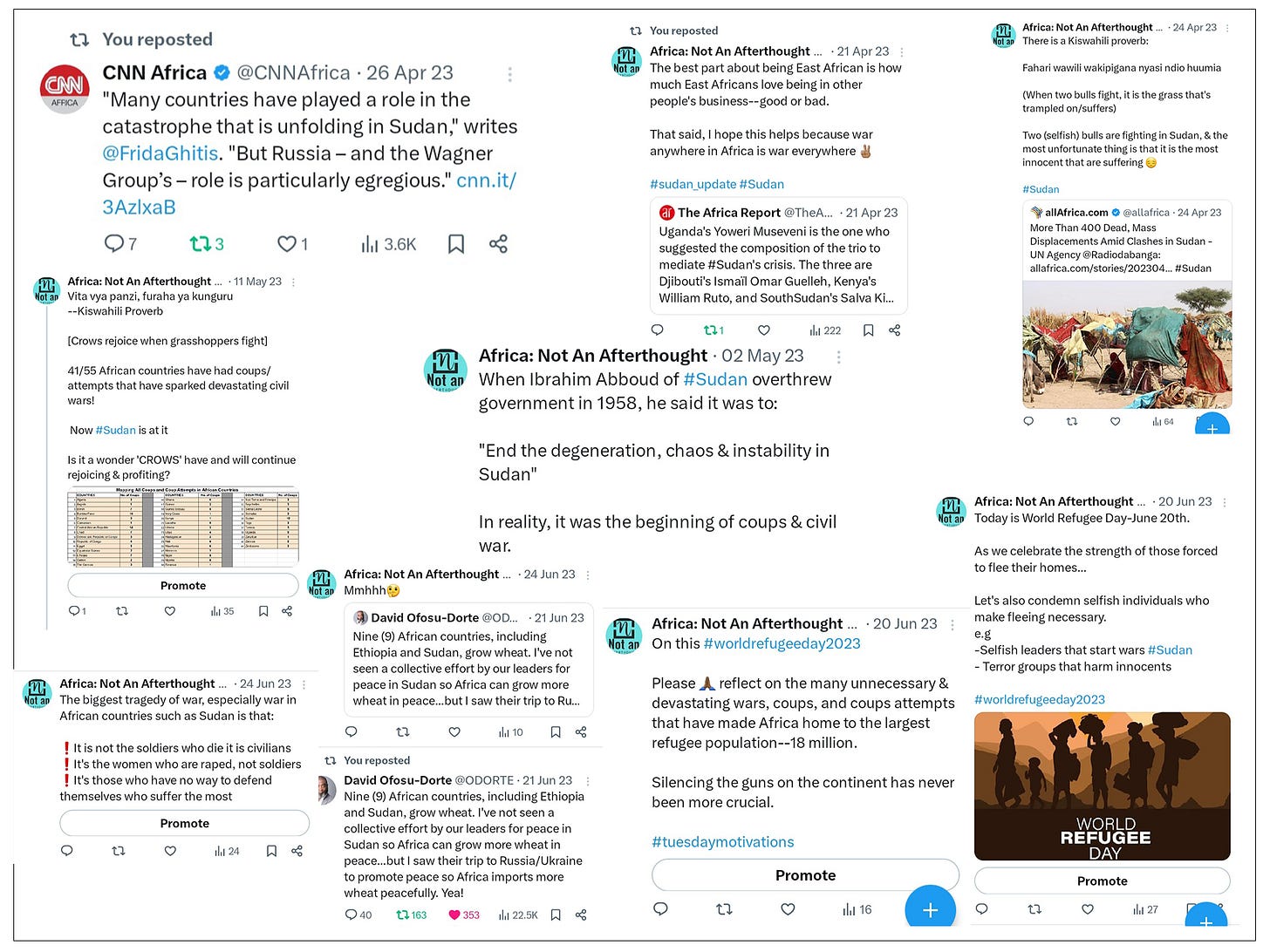Exactly one year ago, the day before yesterday, conflict broke out in Sudan’s capital, Khartoum, between the Rapid Support Forces (RSF) led by Hemedti and Sudan’s Armed Forces (SAF).
The international community and continental bodies shifted the world's attention to the country.
Within nine days, the United States and Saudi Arabia had negotiated a 72-hour ceasefire, and the United States promised to coordinate regional and international efforts.
To prove that they meant it, the US Secretary of State spoke with the chairperson of the African Union, Moussa Faki, on the phone on 26 April 2023 to discuss strategies for permanent peace.
On April 23 and 25, the Comoros President spoke with General Abdel Fattah al-Burhan, the head of SAF and Hemedti. On April 28th, he released a statement saying the conversations had been “rich, constructive and promising.” He further urged the international community to continue supporting the African Union in its efforts to restore peace.
Soon after, the US and Saudi Arabia brokered yet another ceasefire, and on May 6th, they facilitated the commencement of talks in Jeddah. On May 11th, the warring parties signed the Jeddah Declaration of Commitment to Protect the Civilians of Sudan.
For a while, it seemed like Hemedti and General Burhan would adhere to the terms of the declaration, but that lasted only a short time. In response, the regional and international parties slowed down to reevaluate. African citizens did not let up.
Many organized grassroot aid efforts. Phone numbers were distributed on social media with instructions on how individual Africans could help. Twitter and TikTok were awash with conversations condemning the war and calling out the two generals. The idea was to heap so much pressure on both Hemedti and Burhan that they would be forced to reconsider the war.
I was among those exerting pressure through social media. From April all the way to June, I tweeted, joined Twitter Spaces to discuss solutions, and religiously tracked well-known activists such as El Hassan to discover more ways to help.
But soon, it all started to die down. Activists still found ways to post safe escape routes through Telegram & other secure sites and match people in need with resources, but the intensity slowed. Civilians only had so many resources and as they depleted, fatigue set in.
Many more disengaged when it became clear that the war got worse despite the pressure. Others were heartbroken when supporters of the warring parties infiltrated the social media conversations.
Activists on the ground confirmed that posting safe routes on Twitter was no longer secure. The bad guys also had access to the information and bombed the routes as soon as they discovered them.
By August, other conversations had taken over social media, and avoiding what was happening in Sudan became increasingly easy. I tried to keep following what was happening, but you can only hear so much bad news before you decide to shut it off, especially when nothing seems to be changing.
Like many before me, I started disengaging. Helped by the lack of intense media focus—locally and internationally—it was easier to focus on happier matters, such as King Charles's coronation and his choice of Kenya as the first African country to visit.
I pushed Sudan to the back of my mind but did not fully disengage.
When Did I Decide to Look Away?
I remember the exact moment I decided to delete Telegram and stop following the war—when rumors started coming out that both sides were using rape as a weapon of war. It was too reminiscent of the horror stories I heard during the brief post-election violence in Kenya in 2007.
With that came more memories—switching off the lights in our small wooden house and listening hard to the night in case something happened. Throughout the day, there had been rumors that some individuals in the estate would burn certain houses.
The burning never came, but for two months and one day, we existed on hushed rumors and cloying fear. Within that period, 1200 people died in the post-election violence, and many more were displaced. So, when reports came out that the death toll in Sudan was past 5000, I looked away some more.
If the death of 1200 people in Kenya caused that much devastation, how much more 5000 people? If the war continued, the number would rise, and I decided I did not have the mental capacity to deal with or imagine what they were going through. It was all too real.
So, I looked away until this week—the anniversary of the start of the war. It was all over the news, and I couldn’t look away. An estimated 30,000 people are dead (15,000 of them from one village in an alleged ethnic cleansing operation). 8.6 million people have been displaced (4 million of them are children), and half of Sudan’s population requires humanitarian assistance.
That is what my indifference, yours, the international community’s, and the continental bodies’ birthed. Our not wanting to see or confront the pain Sudan’s people were going through did not negate that they were going through it. And as Haile Selassie the first said,
“Throughout history, it has been the inaction of those who could have acted; the indifference of those who should have known better; the silence of the voice of justice when it mattered most; that has made it possible for evil to triumph.”
― Haile Selassie I
I do not want to be indifferent anymore. Sure, it is easier to shrug your shoulders, block it from your mind, and keep living. After all, you are one person; what can you do? I will not lie; that is exactly what I want to do after this week.
But at what cost? We did that for a year, and it only got worse. Remember that old quote, “Adversity visits everyone.” At some point, it will be your turn and my turn. I do not want people to look away when that happens.
First, they came for the Communists.
And I did not speak out.
Because I was not a Communist
Then they came for the Socialists.
And I did not speak out.
Because I was not a Socialist
Then, they came for the trade unionists.
And I did not speak out.
Because I was not a trade unionist
Then they came for the Jews.
And I did not speak out.
Because I was not a Jew
Then they came for me.
And there was no one left.
To speak out for me
--Pastor Martin Niemoller
The ball is in my court and yours now! Why did you look away, and are you ready to speak out before there is no one left to speak out for you?






Beautiful article.
Kudos